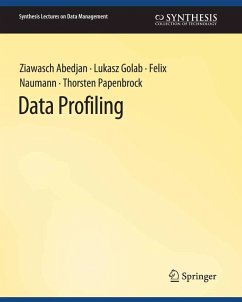Data profiling refers to the activity of collecting data about data, {i.e.}, metadata. Most IT professionals and researchers who work with data have engaged in data profiling, at least informally, to understand and explore an unfamiliar dataset or to determine whether a new dataset is appropriate for a particular task at hand. Data profiling results are also important in a variety of other situations, including query optimization, data integration, and data cleaning. Simple metadata are statistics, such as the number of rows and columns, schema and datatype information, the number of distinct values, statistical value distributions, and the number of null or empty values in each column. More complex types of metadata are statements about multiple columns and their correlation, such as candidate keys, functional dependencies, and other types of dependencies.
This book provides a classification of the various types of profilable metadata, discusses popular data profiling tasks, and surveys state-of-the-art profiling algorithms. While most of the book focuses on tasks and algorithms for relational data profiling, we also briefly discuss systems and techniques for profiling non-relational data such as graphs and text. We conclude with a discussion of data profiling challenges and directions for future work in this area.
Dieser Download kann aus rechtlichen Gründen nur mit Rechnungsadresse in A, B, BG, CY, CZ, D, DK, EW, E, FIN, F, GR, HR, H, IRL, I, LT, L, LR, M, NL, PL, P, R, S, SLO, SK ausgeliefert werden.


